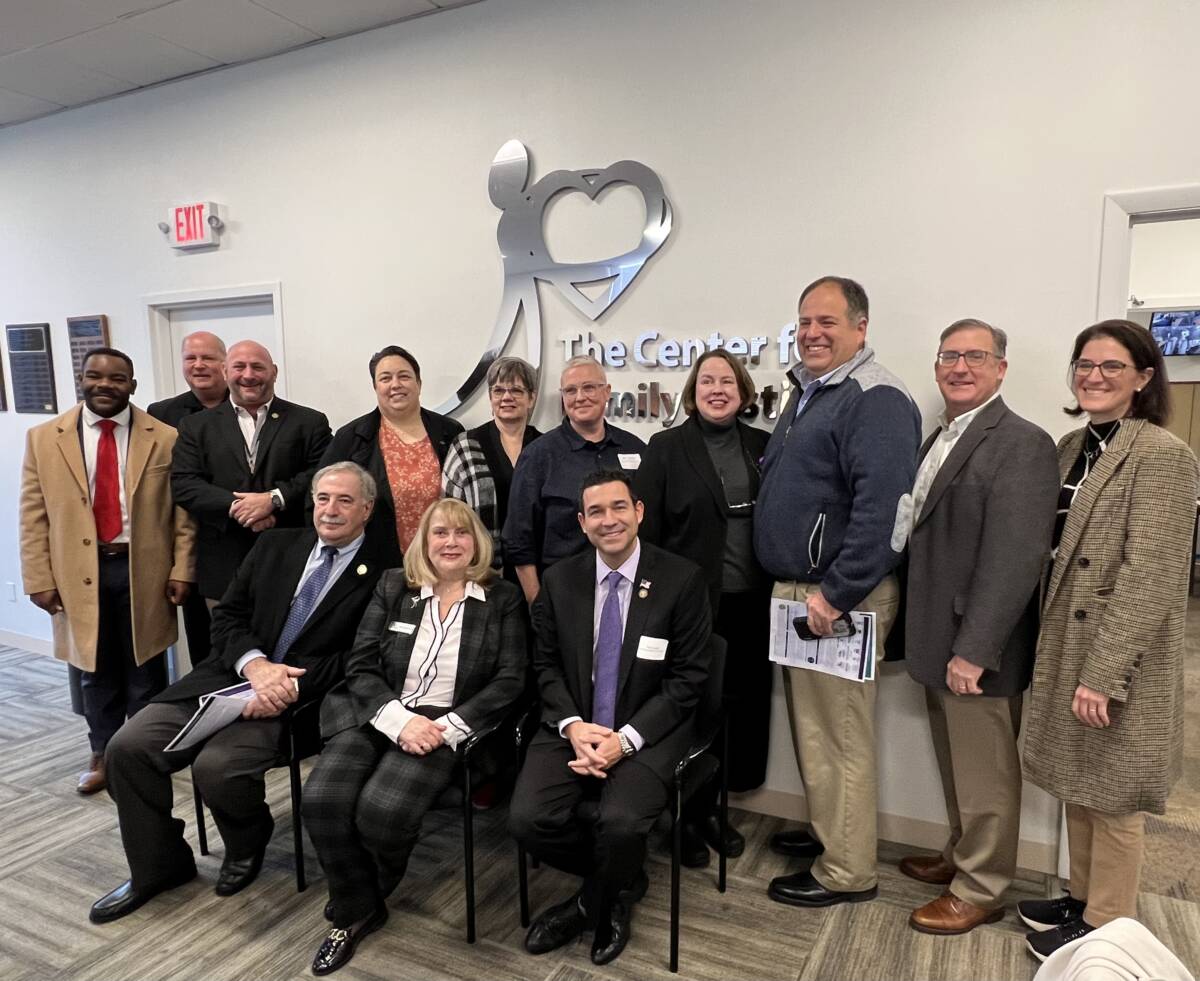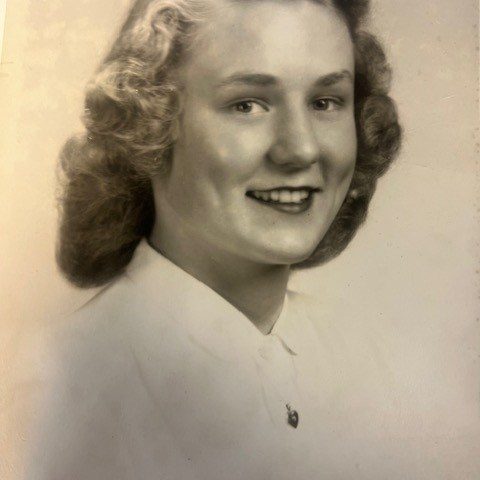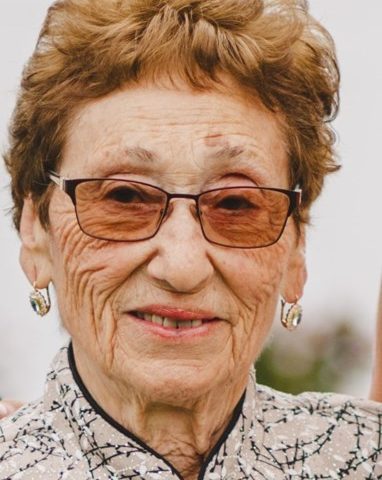BRIDGEPORT, CT — Domestic violence victims fleeing their abusers, many with children in tow, often encounter overcrowding at The Center for Family Justice’s safe house, so the nonprofit agency finds alternative housing for them.
“We don’t turn anyone away. We try to find a safe place,” said Debra Greenwood, president and CEO of CFJ. “But it’s not free. Hotel costs are tough.”
Greenwood said abusers often wield financial power over their victims, making it difficult for them to leave, while those who can afford to move are reluctant to take their children out of school and to leave family and friends behind. Seven-out-of-10 times, she said they end up going back to their abuser.
“The biggest barrier we have is housing,” said CFJ’s Chief Financial Officer Mark Antonini. “We don’t want to have another statistic. We’re here to help you, but we need help too.”
Safe, stable and affordable housing is one of the issues CFJ advocated for during its annual Legislative Breakfast, held at its headquarters Thursday morning.
The event featured a panel discussion and was attended by local legislators, officials from the six communities CFJ serves and community advocates sharing the center’s mission of supporting victims and survivors, while ending the cycle of domestic, sexual and child abuse.
Among those participating in the panel discussion were Greenwood; Jennifer Ferrante, manager of civil legal services for CFJ; Liza Andrews, vice president of government and public affairs for the Connecticut Coalition Against Domestic Violence; and Beth Hamilton, executive director of the Connecticut Alliance to End Sexual Violence.
Among the officials from Monroe in attendance were the breakfast were State Rep. Tony Scott, R-Monroe, and First Selectman Terry Rooney.
“Many of the staff members involved with this incredible nonprofit are Monroe residents and I appreciated hearing more about the crucial work that they do to help survivors of domestic abuse, sexual assault, and child abuse,” Scott said. “They have more than a dozen nonprofits under their umbrella to provide support to those in need.”
Aside from Monroe, CFJ serves Easton, Trumbull, Fairfield, Stratford and Bridgeport. The Center For Family Justice experienced a 32 percent spike in service requests since the pandemic, serving over 5,500 people from these six towns last year.
CFJ’s safe house, which is staffed 24/7, is at 153 percent capacity. During the pandemic, families and homeless individuals were housed in hotels, but those were not staffed 24/7, according to Scott.
“People getting out of domestic situations face a unique challenge in needing a safe place to call home,” Scott said. “The Center for Family Justice doesn’t turn anyone away, but as pandemic-related federal funding runs out they will have a difficult time filling in that gap.”
“We heard during this legislative update meeting that the average length of stay exceeded 60 days, in part because it’s difficult to move out of the community they know, where their kids go to school, where their doctors are, and where their co-workers are,” he added.
In addition to legislators and municipal officials, Greenwood said law enforcement is CFJ’s strongest partner in helping victims.
She also gave a shoutout to Monroe Superintendent of Schools Joseph Kobza and to Bridgeport Public Schools for welcoming CFJ’s education programs into their schools. Greenwood said pretesting and post testing of students shows these efforts are effective in promoting positive relationships.
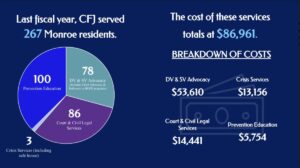 Greenwood showed a sideshow breaking down the number of residents CFJ serves and the costs by community. Antonini told guests to keep in mind that these are only the cases that were reported.
Greenwood showed a sideshow breaking down the number of residents CFJ serves and the costs by community. Antonini told guests to keep in mind that these are only the cases that were reported.
Last fiscal year, from July 1 to June 30, CFJ served a total of 11,600 clients, while spending close to $3.5 million to cover domestic and sexual violence advocacy, crisis services, court and civil legal services, and prevention education.
The center served 267 Monroe residents: 100 with prevention education, 86 for court and civil legal services, 78 for domestic and sexual violence advocacy, and three for crisis services providing a safe house. The total cost was $86,961.
Since 2019, Jennifer Ferrante said CFJ’s civil legal services has connected clients with legal needs to resources, including pro-bono services.
Among the services are helping clients with child custody cases, restraining orders, filling out forms and providing emotional support.
“We have more cases than we can handle,” Ferrante said. “We’re working on a strategic plan to bring in more attorneys.”
Economic justice
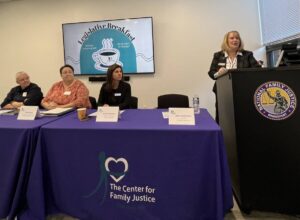
Liza Andrews of the Connecticut Coalition Against Domestic Violence, which includes 18 member organizations, assists approximately 40,000 survivors and children annually, while advocating for them at the State Capitol building in Hartford.
CCADV is also grappling with the problem of providing enough safe housing for abuse victims.
“Money is a very important tool abusers use against victims,” Andrews said. “We advocate for economic justice like equal pay.”
She said abusers sometimes accumulate debt without a victim’s knowledge, hurting their credit rating, while making it more difficult for them to survive financially on their own.
CCADV is trying to help victims forced into debt, as well as advocating for their health and well-being. For instance, women who are pregnant.
The coalition also supports policies to increase infrastructure in the legal system. Last year, the General Assembly formed the Domestic Violence Criminal Justice Advisory Council to review issues of compliance with protective orders and firearms violations, which Andrews sees as a positive step.
Shrinking financial aid
As cases of domestic and sexual violence and child abuse continue to rise, funding to combat it has been on the decline.
Andrews said Connecticut’s share of federal Victims of Crime Act (VOCA) funding, a portion of which is used for domestic and sexual violence services, has been steadily shrinking since a high of $36 million in federal fiscal year 2018.
If the President’s budget proposal passes unchanged, Connecticut’s VOCA funds could go as low as $8 million in federal fiscal year 2024, according to Andrews, who said it no longer appears to be a stable funding source.
Beth Hamilton, of the Connecticut Alliance to End Sexual Violence, said the decrease in VOCA funds coincides with a 32 percent increase in children reporting child abuse in the first two years of the COVID-19 pandemic.
Hamilton said this is important because children who are sexually abused often continue to be victims into adulthood or to become abusers themselves.
The alliance hopes to provide free and low cost legal representation for victims of domestic and sexual violence. It has a legal services team that sometimes helps when law enforcement won’t do a report on a case.
The organization also supports Connecticut Safe at Home, a notification system for victims of people convicted of stalking and sexual violence.
The Connecticut Alliance to End Sexual Violence also advocates for paid Family Leave and expanded Family Medical Leave for victims of domestic and sexual violence, better Title 19 protections for college students reporting an assault, and the addition of training hours for police officers on how to interview victims of trauma, who often feel like they are being accused of lying.

Hamilton said officers in the police academy spend a lot of time training on things like chain of custody, but not interviewing victims of trauma.
“Most of the training is interviewing suspects, so you can see how it leaks into interviews with victims,” Hamilton said.
Gary MacNamara, chairman of CFJ’s White Ribbon Committee and the former Fairfield police chief, said with eight months in the academy and all of the types of training officers have, including body cams, it is hard to add hours.
The Connecticut Alliance to End Sexual Violence wants to ensure hospitals provide all sexual assault victims with rape kits and to change Connecticut laws so it reflects that most sexual assaults are not committed with physical force.
All respectful comments with the commenter’s first and last name are welcome.

